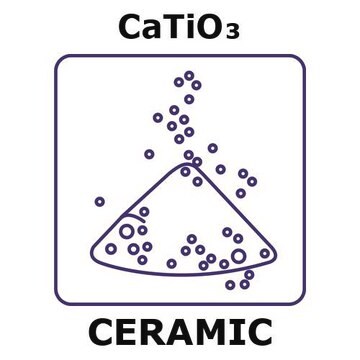633801
Calcium titanate
nanopowder, <100 nm particle size (BET), 99% trace metals basis
Synonym(s):
CALCIUM TITANIUM OXIDE
About This Item
Recommended Products
Assay
99% trace metals basis
form
nanopowder
surface area
5-20 m2/g
particle size
<100 nm (BET)
density
4.1 g/mL at 25 °C (lit.)
SMILES string
[Ca++].[O-][Ti]([O-])=O
InChI
1S/Ca.3O.Ti/q+2;;2*-1;
InChI key
AOWKSNWVBZGMTJ-UHFFFAOYSA-N
Looking for similar products? Visit Product Comparison Guide
Related Categories
Storage Class Code
11 - Combustible Solids
WGK
WGK 2
Flash Point(F)
Not applicable
Flash Point(C)
Not applicable
Personal Protective Equipment
Regulatory Listings
Regulatory Listings are mainly provided for chemical products. Only limited information can be provided here for non-chemical products. No entry means none of the components are listed. It is the user’s obligation to ensure the safe and legal use of the product.
JAN Code
633801-25G:
633801-VAR:
633801-BULK:
633801-100G:
Choose from one of the most recent versions:
Already Own This Product?
Find documentation for the products that you have recently purchased in the Document Library.
Customers Also Viewed
Articles
Synthesis, Properties, and Applications of Perovskite-Phase Metal Oxide Nanostructures
Perovskite-phase metal oxides exhibit a variety of interesting physical properties which include ferroelectric, dielectric, pyroelectric, and piezoelectric behavior.
Our team of scientists has experience in all areas of research including Life Science, Material Science, Chemical Synthesis, Chromatography, Analytical and many others.
Contact Technical Service








